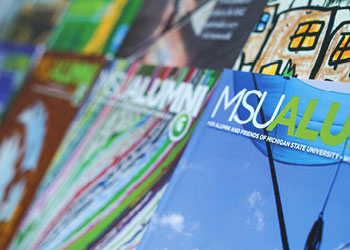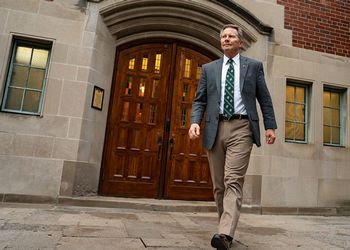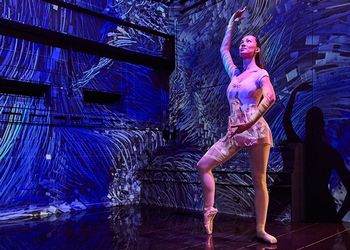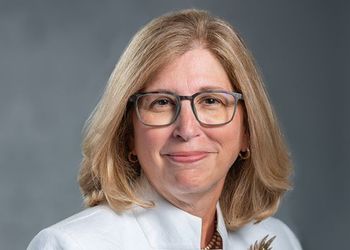Feature: MSU'S Community Music School

One of MSU’s most popular community outreach efforts now boasts a new headquarters across from campus, positioning it to broaden its reach.
Although he received his degree nearly 50 years ago, Paul Howe, ’65, still comes to the MSU campus for class every week. Rather than earning credits, he says he receives satisfaction, fulfillment and relaxation by playing music with the New Horizons Band, a program of MSU’s Community Music School (CMS).
Howe is one of the more than 3,000 community members in the greater Lansing area who attend CMS every year. An additional 500 or so people participate every year in Detroit, where CMS opened a second site in 2009.
The activities vary from early childhood music education for children up to five years of age, who are just beginning to develop their musical skills, to the New Horizons Band for adults who want to challenge themselves by learning an instrument, to the Royal Conservatory Music Development Program, a nationally recognized standard of musical success that prepares young musicians for college or conservatory study.
CMS is the outreach division of the MSU College of Music and offers music to people of all ages, abilities and incomes.
This coming fall, CMS will celebrate its twentieth anniversary in a newly opened and renovated building in East Lansing. The facility, bought in October, sits on Hagadorn Road just east of Shaw Lane. True to the land-grant roots of the university, CMS seeks to enrich lives and serve the community while providing enhanced educational opportunities to MSU students.
“It is natural to have a division that serves a broader public and also has the ability to provide additional and excellent opportunities for our students and faculty,” says James Forger, dean of the College of Music. “CMS breaks down the stereotypical vision of a performer walking out on stage and playing something virtuosic. It’s more than that. It is community-based. It is interactive with a whole range of individuals with varying experience and skill levels, from beginner to highly advanced. It is a very democratic process that values everyone regardless of ability.”
Access to music education and music therapy is a major part of the CMS mission. The school is open to all ages and abilities and also strives to make programming possible at all income levels. To this end, the school offers financial aid to those with need. Each year, more than $70,000 is granted to low-income students in Greater Lansing and Southeast Michigan. Financial aid dollars come from individual donations, charitable gifts and grants.
“Music is life giving,” says Rhonda Buckley, executive director of CMS. “I’ve seen it transform the lives of participants, helping them recognize new skills and find great joy. The message is that music is not only for the elite, but for everyone. It can make a great difference in lives, which is why access cannot be fully dependent on one’s ability to pay.”
MSU students may take non-credit music classes at CMS for their own enjoyment, or they may become involved with CMS by teaching or taking MSU courses that use the school as a learning laboratory. Currently, 20 MSU College of Music faculty, 64 undergraduate and graduate students and 69 professional musicians from the community teach or assist with programs at CMS in East Lansing and Detroit.
“Keyboard Methods and Literature” is taught by Derek Polischuk, associate professor of piano and director of piano pedagogy in the College of Music. Under Polischuk’s supervision, MSU students gain real-world teaching experience through CMS, where they teach the group piano class to children ages 7-9.
Music performance and music education double major senior Dan Miner took Polischuck’s class last year. “Teaching at CMS was really an eye-opener to me as I had never worked in a group piano setting before,” says Miner. “It opened the door for being creative in our teaching and doing many different types of activities to teach piano and music.”
Another MSU course that partners with CMS to enhance student learning is “Music in Early Childhood,” taught by Cynthia Taggart, professor of music education in the College of Music and area chair of early childhood music education at CMS. Early childhood music education classes are designed to immerse children in a rich, playful music environment and are attended by both the child and a caregiver, usually a parent.
The program was one of the original classes offered when CMS opened in 1993. Most of those who have passed through Taggart’s course have become employed as teachers in early childhood music education. While some have stayed in the area and continued to teach at the school, others have pursued careers in academia themselves.
“The faculty that we have had in our program, who came here as graduate students, have gone on to do great things and have started programs at their institutions,” says Taggart. “The good work here has really spread all over the country. It’s fun to see it take off. There are people who have passed through our program and used our program as a sort of stepping stone to going on and doing their own terrific work. Many are doing research and really contributing to the knowledge base.”
Brittany Chase is seeking her master’s degree in music performance and has taken Taggart’s course. She is currently an assistant teacher in two early childhood music classes at CMS.
“The connection between CMS and Dr. Taggart’s class is inseparable, and I cannot imagine taking such a class without the experience of working with children,” says Chase. “Doing mock teaching with your peers is helpful, but you learn so much more when experiencing these things with children. It helps to have that exposure to a real classroom and start gaining the information that can only come through the first-hand experience of teaching.”
CMS students include infants, octogenarians, MSU college students and everyone in between.
Sophie Spano, age 10, is a member of the CMS Singers, one of six youth choirs at CMS. Her mother, Elizabeth Marazita, ’94, heard about the program through a friend and enrolled Sophie one and a half years ago.
“I think there are connections to hard work and good character that are also core music values,” says Marazita. “Music is a universal language that she is learning. It is truly a community choir and a way to meet other families with similar interests. I appreciate that they sing in so many different community venues. Knitting together so many community affiliations is good for our children’s souls.”
Community collaboration is a key component of CMS, allowing the school to reach even deeper into Greater Lansing and Detroit. CMS partners include the Detroit Symphony Orchestra, the Lansing Symphony Orchestra, Early On, Hospice of Lansing, Coalition on Temporary Shelter and the Community Mental Health Authority of Clinton, Eaton and Ingham Counties.
The partnership with Community Mental Health makes music therapy group sessions possible for more than 20 adults with special needs each year. In the sessions, participants use music to build skills such as socialization, communication and motor skills under the guidance of a board certified music therapist. The project is partially funded by the Capital Region Community Foundation.
Nathan Wood, senior developmental disabilities clinician at Community Mental Health, is one of the staff members who accompany the two groups to CMS each week.
“We really enjoy music therapy sessions,” says Wood. “Every time we go, we are delighted to attend and excited about what is going to happen. When those who are non-verbal participate and smile from ear to ear, we know they are pleased to be a part of music therapy.
“When monies are invested in people, the return is most rewarding for them, their families and the community. It makes their lives more fulfilling.”
The CMS experience is different for each student. Some students, like Howe, attend because they enjoy making music. Students like Spano participate for a sense of community and to gain important life skills. Others, such as those who participate through Community Mental Health, use music as a therapeutic intervention. Still others ultimately find their career paths through study at CMS. This was the case for music education sophomore Cody Edgerton.
Edgerton first came to CMS at age four. He participated in early childhood music classes, private piano lessons and music theory classes. Today, Edgerton is a sophomore music education major. He also plays snare drum in the MSU Drumline.
“Early experiences at CMS laid the groundwork for my continued musical career here,” says Edgerton. “I think I often take it for granted that I was raised with a musical background and musical training, and that many of my classes now as a music major are more manageable because of these skills.
“Without a doubt, these classes have made me a better musician today, but also a better teacher of music because I understand musicianship at a broader level.”
Megan Bowker, ’12, had a similar experience. She began attending CMS at age six, studying violin through the Suzuki program and also taking music theory classes. Suzuki is a pedagogical method of teaching that follows the premise that learning is the product of environment and relies upon the parent-student-teacher triangle of learning. Bowker studied at CMS until she graduated from high school.
“CMS has pretty much shaped me as a musician,” Bowker says. “I practically started here. It’s not just the information that has shaped me, but the people too. I feel lucky to have that. I got a really full musical education here, and it prepared me really well to go to Michigan State University.”
Since her graduation from MSU, Bowker has transitioned to teaching at CMS and now teaches alongside those who once taught her. She gives violin lessons, runs Suzuki group lessons and offers a beginning violin class.
“I feel like I am giving back to the school that gave me so much when I was little,” she says.
With its new location on Hagadorn Road, the school is positioned to reach a broader population. The site is more convenient for MSU students and is now located on a bus route. The site also offers greater visibility since it is now on a main road.
“Our new location gives us a terrific opportunity to engage with the university and community in new ways,” says Buckley. “We are expanding our offerings, connecting with new groups on campus, and increasing our role as a hub for arts and culture in the area. We’re excited about what our next 20 years will bring and tremendously thankful for the support of the university and the community.”
Amanda Darche, ’03, is the grant writer and communications coordinator for the MSU Community Music School. She attends early childhood music education classes at CMS with
her one year old daughter.
Music for All
To make music accessible to everyone, financial aid is available for students who meet income requirements. In 2011-12, 590 people at CMS East Lansing and CMS Detroit received nearly $80,000 in assistance.
Financial aid dollars come from gifts received from corporations, foundations and individuals. If you wish to support CMS, send your gift to:
MSU Community Music School
4930 S. Hagadorn Rd.
East Lansing, MI 48823
Please indicate “CMS-EL financial aid” or
“CMS-D financial aid” in the memo line.
Gifts may be made online at cms.msu.edu/give.



